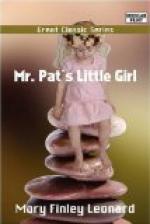A smile flitted across Rosalind’s face; her uncle had spoken with a good deal of heat. Allan himself laughed. His fits of irritation usually ended in this way.
“Well, it is all over now, and we may as well make the best of it. You shall have Patricia’s miniature if I can get it for you.”
“Thank you,” said Genevieve, really gratified. “I fear you do not know what you are promising.”
Rosalind wondered how her uncle felt in regard to the Fairs, and she once or twice mentioned Celia, watching him furtively meanwhile. There was, however, no shadow of a change in his expression, and he made no comment.
A vast difference was made in the house by Allan’s return. He stood in no awe of Miss Herbert, had no qualms about disturbing the drawing-room blinds or leaving the front door open from morning till night,—a Friendship custom which did not recommend itself to the housekeeper. A high cart and a swift-footed mare made their appearance, and Rosalind was often her uncle’s companion on his visits to the farms belonging to the estate.
Allan was continually expecting his interest in Friendship to languish, but it did not, and after a few weeks he gave up all thought of the western trip.
The middle of July saw Genevieve on her way to the North, and a little later Miss Herbert went home on a holiday. After their departure peace settled down upon the house behind the griffins.
The Arden Foresters found the summer days none too long. They still met Celia in the arbor now and then; and it was her stories of the Gilpin house, of the ring and the spinet, together with the constant sight of the closed shutters and doors, that led to an adventure one warm August day.
“Important meeting at the oak tree this afternoon,—a discovery!” was the startling announcement Rosalind found within the grass-tied missive on the cedar when she returned from a drive with her uncle one morning. She could hardly eat her luncheon for eagerness to know what the discovery might be, and the sound of Maurice’s low whistle further upset her.
Mrs. Whittredge was rigid where table manners were concerned. Rosalind might not be excused until every one had finished; and to-day Uncle Allan dallied over his dessert, discussing business and the new mills with his mother, while Rosalind’s impatience grew.
She looked up despairingly at the stern countenance of Great-uncle Allan, and then at the placid smile of his Matilda, which seemed a rebuke to her restlessness. “I wonder what you did with your satin dress?” she suddenly remarked aloud.
Grandmamma turned toward her in surprise, and Allan, deep in a description of the manufacture of a new kind of paper, looked at her blankly.
“Do you think it is polite to interrupt?” asked Mrs. Whittredge.
“I beg your pardon, Uncle Allan, I was just thinking. I did not mean to say it out loud,” Rosalind explained, in great contrition.




